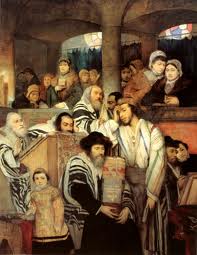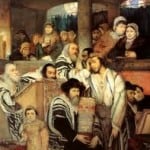In the Torah portion of “Acharei Mot “ ( Leviticus 16:1-18-30) we read the following
regarding Yom Kippur:
“For on this day it shall atone ( Yechaper) for you to cleanse ( LeTaher) you. Before HaShem, you shall be cleansed from all your sins .It is a shabbat of solemn rest unto you, and you shall afflict your souls; it is a statute for ever.(Vayikra/ Leviticus 16:30-31).
Based on these words, our sages have explored the redemptive power of the actual day of Yom Kippur. The renowned sage Rabbi Yehudah HaNasi went so far as to maintain that atonement is granted on Yom Kippur whether or not a sinner repents, because “the essence of the day (itzumo shel yom mechaper) atones.” [Yoma 85b] . The majority of the Sages maintain that repentance is obviously necessary first. Their understanding is that the “essence of the day” is powerful but needs the softened and repentant heart to be its vessel.
The Rambam as well declares that “On Yom Kippur, it is the day itself that atones…..as it is written “For on this day it shall atone for you” (Mishneh Torah, laws of repentance 1:3) Yet that rectification refers only to the sins between mankind and G-d. Sins between man and man, on the other hand, must be further explored and rectified by the individual.
Regardless of the differing views, we are struck by the power of the day itself. How can a moment in time have an influence on the spiritual journey of an individual? In a world that sees time as something that passes us by, this concept is truly incomprehensible. The Torah festivals are called “mikra’ei kodesh -callings of holiness,”. That is to say that each is a gateway we pass through and are then given the power to “call forth” specific sparks of spirituality and holiness . Each biblical festival at its appointed time , releases its own unique spark. Yom Kippur therefore calls forth the potential spark of repentance. It impacts the soul in such a way to empower it to seek repentance.
Yet we must still ponder the fact that the individual striving and effort of each soul seems to have become lessened in importance. That is problematic, for as we know HaShem says in the book of Malachi “Return unto Me, and I will return unto you, said HaShem of hosts.( Malachi 3:7) Then again we hear the words of the prophet Zechariah .”Therefore say you unto them, Thus said HaShem of hosts: Return unto Me, said HaShem of hosts, and I will return unto you, said HaShem of hosts. (Zechariah 1:3 )
HaShem waits for our initial returning to Him with a contrite heart . ” Have I any pleasure at all that the wicked should die? said HaShem G-d; and not rather that he should return from his ways, and live? ” (Ezekiel 18 :23 )And then we read in a further verse “For I have no pleasure in the death of him that dies, said HaShem G-d; therefore turn yourselves, and live( ibid :32)
In order to understand this we must focus on the specific word used in the verse and then by our sages. The verse reads ““For on this day it shall atone ( Yechaper) for you to cleanse ( LeTaher) you.” (Leviticus 16:30) It is important to note that our sages discussed the power of Yom Kippur to atone ( Lechaper) for sins and they did not use the term ” to cleanse”(LeTaher)
The Malbim in sefer HaCarmel describes the word Lechaper – to atone as having several possible meanings. It can mean “ to cover” , to”redeem” or to “superficially wash” . Yet all those three actions do not truly remove the sin. They simply cover or beautify it. The sin and its potential impact continues to exist in the world .The sin still needs to be made pure or to be deeply cleansed. So one might ask why we bother with a Kaparah that simply covers, if in fact we have not eliminated the essence of the sin itself?
To understand this one must truly ask another question “Who are we covering the sin from? The instinctive answer is that we are attempting to hide or cover our sins from G-d. That cannot be true as King David declares in psalms ” For He knows the secrets of the heart.(psalms 44:22) and in the book of Job we read” I know that You can do everything, and that no purpose can be withholden from You.”( Job 42:2)
The prophet Isaiah says ” But your iniquities have separated between you and your God, and your sins have hid His face from you, that He will not hear.”( Isaiah 59:2)
As a result of our sins, we have begun to feel so unworthy and we have turned further from away G-d. Yet sin does not keep G-d away from man, sin keep man away from G-d. We feel so unworthy and so dirty that we cannot even “look upon His face “Ezekiel declares” Therefore, O you son of man, say unto the house of Israel: Thusly you speak, saying: Our transgressions and our sins are upon us, and we pine away in them; how then can we live?”(Ezekiel 33:10)
So G-d gives us the method to cover the sins from ourselves. It is only after they have been covered from our sight that we regain the determination to gather our strength and continue into the intense process of tahara, or cleansing.
The sages understood that the essence of the day achieves that “covering”. (itzumo shel yom mechaper) . The disagreement whether that covering can only come as a result of repentance or that repentance simply follows, does not negate in any way the power of choice that HaShem has implanted in our souls. HaShem has created a day wherein the potential and the spark of repentance is released .As a result we are then empowered to do the difficult but glorious work of cleansing our soul before our Father in Heaven.
On this day He waits patiently and with the expectation that we begin the work. “And therefore will HaShem wait, so that He may be gracious unto you, and therefore will He be exalted, that He may have compassion upon you; for HaShem is a God of justice, happy are all they that wait for Him “( Isaiah 30:18) . May we all strive to live up to His expectations.

